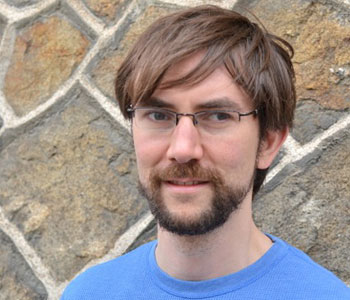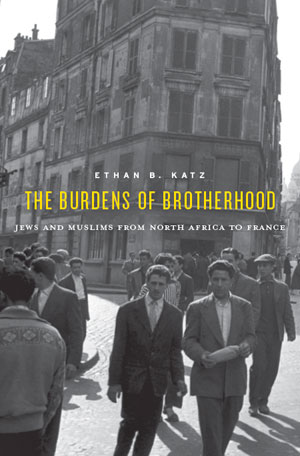
Today, headlines from France depict the country’s Muslims and Jews as ever, inevitably in conflict. Numerous commentators suggest Muslim attacks against Jews are the newest chapter in an age-old anti-Jewish struggle. Others assume that tensions between France’s Muslims and Jews are simply “spillover” from the Israeli-Arab conflict. The Burdens of Brotherhood shows that each of these accounts is far too simple. The past tells a more complex, often surprising story.
The book offers a history of social, political, and cultural interactions between Jews and Muslims in France from World War I to the present. As I say in the introduction, I encourage the reader to begin by rethinking the assumption that relations between Jews and Muslims are necessarily best understood as “Jewish-Muslim relations” and that these relations have essentially been hostile. The book shows that Jews and Muslims in France have often perceived their relations through categories other than those of ethnicity or religion. Jews and Muslims have interacted on myriad terms: as fellow migrants, political allies and opponents, citizens and subjects of the French empire, shopkeepers and clients, fellow North Africans, musicians or athletes, neighbors, friends, and even lovers and family members. The book also argues that the importance and the very meaning of Jewishness and Muslimness in their interactions has been highly contingent, or what I term “situational,” varying from person to person and context to context. For instance, being Jewish and Muslim might be relatively incidental for two neighbors exchanging pleasantries in the street. But it might be terribly important to the same neighbors if they exchange pastries on each other’s religious holidays. And Jewishness and Muslimness might also be important but carry very different meanings when these same neighbors exchange views – or avoid doing so – regarding violence between Israel and its Arab neighbors in the Middle East.
Finally, the book contends that one cannot understand Jewish-Muslim relations in France without placing France itself at the heart of the story. This has been what I term a “triangular” affair, so that the French state, French society, and notions of what it means to be French have always been at the heart of the way that Jews and Muslims perceived and interacted with each other.
Unlike other works that deal with Jewish-Muslim relations in contemporary France or in the second half of the twentieth century, my book begins with the earliest relations between large numbers of the two groups, during World War I. This long-term perspective is crucial. We see how wars, migrations, and the twinned rise of the nation-state and fall of empires transformed identity and politics for Jews and Muslims. In the process, the same developments etched new boundaries between the two groups. The book also tries to understand the consequences of these changes not only for state actors or elites but in the lived lives of ordinary people. In part, the book does this with a focus on local factors. Throughout, I compare relations between Jews and Muslims in three very different French cities – the capital and great metropolis of Paris, the country’s Mediterranean port city, Marseille, and Strasbourg, long-time commercial center in the disputed region of Alsace on the Franco-German border. We see that even rising international and national tensions did not dictate the tenor or terms of relationships between all Jews and Muslims. Readers thus hopefully can see that this is neither simply a story of ever-escalating conflict nor one of peaceful coexistence suddenly shattered in the early twenty-first century by events in the Middle East.
I first became interested in this topic because of a few long-standing interests: French history, Jewish history, and the past and present of the struggle between Jews and Arabs in the Middle East. France’s persistent Jewish-Muslim crisis since 2000 seemed to reflect the impact of the Israeli-Palestinian conflict on life in France. Ironically, as I went about my research for this book, I quickly came to understand that other dynamics were perhaps more central to the story. To be sure, the Israeli-Palestinian conflict would become very important for Jewish-Muslim relations in France, especially after 1967, but its relevance has in many ways been filtered through a series of other factors specific to France.
In the long term, the history of France’s colonial empire in North Africa, especially in Algeria, forms the most important political context for understanding relations between Jews and Muslims in France. Algeria’s centrality comes from the fact that this very large territory was ruled by France from 1830 to 1962 and in large part annexed to France proper. Large numbers of migrants from the empire came to France, particularly during and following the period of the independence struggle in Algeria (1954-1962). Throughout the colonial era, the French state struggled to come to terms with what it meant to be at once the country of the French Revolution of 1789 and the Declaration of the Rights of Man and the Citizen, the first country in Europe to emancipate its Jews, a country that proclaimed that the Muslims of Algeria could assimilate and become equal over time, on the one hand, and on the other, a vast global empire with brutal inequalities in many of its holdings, including Algeria. Simultaneously, France sought to negotiate the place of minority faiths in a country that since 1905, has had a strict separation between religion and public life, but where Catholicism long remained key to large parts of the culture.
Jews and Muslims were repeatedly in the crosshairs of these struggles over universalism and secularism. The two groups faced many of the same challenges, but their positions were rarely equivalent. To cite what is perhaps the most important example, Jews in Algeria became full French citizens in 1870, acquiring all the corresponding rights and privileges. Muslims, meanwhile, faced systematic legal discrimination and frequent violence at the hands of both the French administration and the European settler classes. They only acquired equal rights as French citizens in 1958, four years before Algerian independence.
So from the case of Jews and Muslims, we learn a great deal about the complexity and unevenness of inclusion and exclusion in modern France, and the factors that made it more and less possible for Jews and Muslims in the Francophone world to coexist. We see as well that there are many contexts for Jewish-Muslim relations in modern times that do not begin or end in Israel/Palestine.
The book begins by plunging us into what is in many ways the heart of the story. Thus for the reader browsing in the bookstore, the opening pages are as good a place as any to look.
I start the book by recounting the story of Simon Zouaghi and Martin Mardochée Benisti, two Jewish men just arrived from Algeria who show up in late August 1961 at the government’s Service of Muslim Affairs in Marseille looking for help. Zouaghi and Benisti, despite the existence of various other state resources and the substantial aid efforts of Jewish community organizations, were only two of the roughly 1000 Jews from Algeria in 1961-1962 who sought assistance at this government agency designated specifically for Muslims. This is all the more striking because it was during the very period when increasing numbers of Jews in Algeria were essentially fleeing from the prospect of living under majority-Muslim rule as the bitter struggle over Algeria’s future drew to a close.
What are we to make of such a story? It is hard to be certain of why these Jews chose to try their luck at the Service of Muslim Affairs. What we do know is that these Jews came mostly from modest socio-economic backgrounds. Many were small shopkeepers and artisans. On average, these were the Jews in French Algeria most likely to maintain traditional North African religious customs, clothing, cuisine, and culture, Arabic language, and – correspondingly – to have close relations with their Muslim neighbors. Therefore, Muslim fellow emigrants may have told some of these Jews about the Service. At a minimum, the choice implies the relative comfort of these Jews with things labeled “Muslim.” Moreover, it reveals that ethnic or religious labels did not define all Jewish-Muslim interactions or decisions at this time.
The document from which we learn about these Jews is also highly revealing of this moment where so much was uncertain and a great deal hung in the balance. At the top of the list that includes these Jews, a French bureaucrat has scrawled the label “French coming from Algeria received at the Service of Muslim Affairs.” Remarkably, this label was made atop a list that only included Jews and European settlers from Algeria, even as all Muslims coming to this service were also themselves full French citizens. Within several months, the French state would begin to strip Muslims from Algeria of the French citizenship that they had acquired in 1958, and to separate all newcomers from Algeria officially into two distinct ethnic categories as “Europeans” (French citizens, a group that included Jews) and “Muslims” (non-citizens). Therefore, we can see that one member of the French administration was trying to impose a hard separation here between different groups from Algeria at a moment when such categories were in tremendous flux. The outcome of the months surrounding the end of the war, wherein the French state cast millions of Muslims out of the French body politic – while at the very same moment guaranteeing the French citizenship of all 130,000 Jews who came to the mainland – proved decisive. This difference paved the way for all kinds of divergences between many Jews and Muslims in France for decades to come – in terms of available social services, residency patterns, education and employment opportunities, and more.
What I hope many readers will take from The Burdens of Brotherhood is several things. First, the book tells not only a set of big stories about national and international politics and conflicts, but also many small stories – about coffeehouses and musicians and neighborhoods and political alliances and conflicts and even romances between Jews and Muslims. These stories illustrate how so many ordinary Jews and Muslims have interacted in ways that far escape the definition of their encounters as simply “Jewish-Muslim” relations. These encounters cut against the grain of contemporary reports that repeatedly reduce Jewish-Muslim relations to inevitable conflict or claim that they are based solely or even primarily on religion and ethnicity. Secondly, the way that this is specifically a French story may surprise many readers who expect to read about a variation on the Israeli-Palestinian conflict. This book attempts to show how vital the role of the French state has been in creating both opportunities and obstacles for inclusion for Jews and Muslims that have played a fundamental role in the two groups’ relations with each other. Finally, given the crisis that France faces today, where conflict between religious and ethnic groups has taken center stage, I hope that the book can serve as a resource for citizens, interested observers, and maybe even a few policymakers to begin to understand how we got to where we are today, and how the complexities and unexpected developments of the past should make us see not only dangers but also possibilities as we examine the present.


Ethan Katz is Associate Professor of History at the University of Cincinnati. His book The Burdens of Brotherhood has won several honors, including the J. Russell Major Prize from the American Historical Association, a National Jewish Book Award, and the American Library in Paris Book Award. He is also the co-editor of Secularism in Question (UPenn, 2015) and Colonialism and the Jews (Indiana, forthcoming). Katz is currently visiting faculty at the Hebrew University, where he holds fellowships from the Yad HaNadiv/Beracha foundation, the Lady Davis Trust, and the Vidal Sassoon Center. He is at work on a new book entitled Freeing the Empire: The Jewish Uprising That Helped the Allies Win the War.